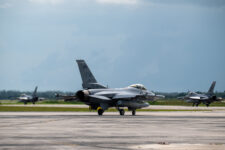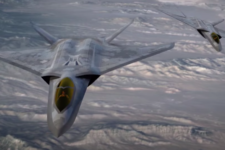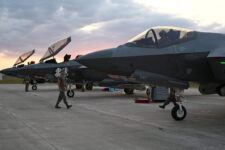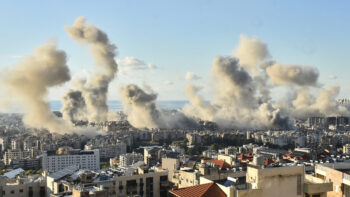
Firefighters appear on the scene to put out a fire in a four story residential building after a “kamikaze drone” attack early morning on October 17, 2022 in Kyiv, Ukraine. (Paula Bronstein /Getty Images)
WASHINGTON — The increased targeting of Ukrainian civilians is tied directly to Russia’s newly installed head of the war effort, according to Estonian Minister of Defense Hanno Pevkur.
Speaking to Breaking Defense ahead of a Tuesday visit to the Pentagon, Pevkur pointed the finger at Russian Gen. Sergey Surovikin, who earlier this month was put in charge of what Russia has termed the “special military operation” in Ukraine. Surovikin built a reputation for himself in Syria, which saw numerous reported examples of attacks on civilian populations.
“The game changer at the moment seems to be the new general in the Kremlin,” Pevkur said. “Definitely, we know his behavior in Syria … that he’s not afraid to send weapons against civilians. So this is his way of conducting the war. It was [expected] that we will see something like that after the news of Surovikin” being appointed.
Kyiv has been rocked over the last week with attacks from missiles and Iranian-made suicide drones, attacks that have been condemned on the world stage as targeting civilians.
Pevkur described the situation as a “very difficult time for Ukraine, but also for Russia,” noting that it appears to be at an inflection point that could tip the balance of the conflict three ways: towards Ukraine’s favor, should the NATO nations increase their military assistance; towards a long, drawn out stalemate should things remain as they are; or towards a Russian breakthrough, although, he said, “I didn’t see the third option, that Russia will gain some initiative again” as likely.
Another emerging wrinkle in the conflict is a build up of forces in Ukraine’s northern neighbor Belarus, largely viewed as a Russian vassal state under President Alexander Lukashenko. A week ago, Lukashenko announced that Russian forces would be returning to Belarus, from where the initial invasion stab at Kyiv was launched in February. That buildup appears to involve aviation assets, although details are currently fuzzy.
For his part, Pevkur assessed that the buildup in Belarus is more about dividing Ukrainian forces than a real threat of Belarus joining the war. Doing so “means that a significant part of [Ukraine’s] army will be staying in north to protect Kyiv, which means that they don’t have these troops on the front line in south and east,” he noted. “I don’t see at the moment that [Belarus] is ready to go to war, because it is [an internal political] problem for Lukashenko for sure.
“But, let’s see” Pevkur added. “In a war like this, unfortunately … we can assess maybe a week, two” at most with confidence.

Estonian defense minister Hanno Pevkur (r) visited Ukraine in September. (Estonian MoD)
Estonia was famously the victim of a 2007 cyber attack that impacted all levels of society, and is held up as the ur-text of concerns when discussing the impact of cyber assaults. While Russia’s cyber capabilities have not been deployed nearly as successfully in Ukraine as had been anticipated before the war began, Pevkur stressed that they remain a threat.
“The threat is still there and the capabilities are still there,” he said of Russia. “I always say that with cyberattacks, it can cause even more problems for societies, for civil societies, [than] conventional attacks, because with a cyberattack, you can basically take down the electricity or the energy supply for the whole of Kyiv. With the bombing you can take down maybe a part of the city.
“So in that sense, the cyber threat is something we cannot avoid and we have to be ready for that. But I also believe that in tackling the cyber threats, it is very, very crucial and very, very important to make a good cooperation with the civil forces, with the private contractors. And of course, I also believe that every infrastructure company has to be ready to tackle all kinds of cyber threats. Because it’s just unimaginable what you can do with the cyberattack.”
RELATED: Ukraine, rushing into ‘digital transformation,’ prepares for more Russian cyberattacks
Asked if he believes Estonia’s domestic firms are as prepared as they should be, the minister replied “more or less.”
“In Estonia, everyone understands that what the cyber threat is. Since 2007 it’s not a question for us,” he said. “What we are doing, then, we are testing our own systems and our own companies from the government side. The cyber hygiene has to be there for everyone.”
The terror of war, a helo crash mystery and the business of defense: 5 Middle East stories from 2024
From eye-witness accounts of the Israeli invasion of Lebanon to a rare appearance of Iranian weapons at a foreign arms expo, there’s a selection of Breaking Defense’s Middle East coverage.

























